Intro
Learn about Colon Resection Surgery, a life-saving procedure for colon cancer, diverticulitis, and bowel obstruction, in our comprehensive guide, covering preparation, risks, and recovery, to make informed decisions about your intestinal health and surgical options.
The concept of colon resection surgery has been a topic of interest for many individuals, particularly those who have been diagnosed with colon cancer or other colon-related health issues. This surgical procedure involves the removal of a portion of the colon, which is a critical part of the large intestine. Understanding the importance of this surgery and its potential benefits can be life-changing for those who are struggling with colon health problems. As we delve into the world of colon resection surgery, it is essential to recognize the significance of this procedure and how it can impact an individual's overall well-being.
The human body is a complex and fascinating system, and the colon plays a vital role in maintaining our overall health. The colon is responsible for absorbing water, salts, and other essential nutrients from the food we eat, while also eliminating waste products from the body. However, when the colon is affected by disease or injury, it can lead to a range of symptoms, including abdominal pain, changes in bowel habits, and weight loss. Colon resection surgery is often necessary to remove the affected portion of the colon and prevent further complications. By exploring the world of colon resection surgery, we can gain a deeper understanding of this procedure and how it can help individuals overcome colon-related health issues.
As we navigate the complexities of colon resection surgery, it is essential to recognize the various factors that contribute to the development of colon health problems. A combination of genetic, environmental, and lifestyle factors can increase an individual's risk of developing colon cancer or other colon-related diseases. By understanding these risk factors and taking proactive steps to maintain a healthy lifestyle, individuals can reduce their risk of developing colon health problems. Furthermore, advancements in medical technology and surgical techniques have made colon resection surgery a safer and more effective procedure, offering new hope to individuals who are struggling with colon-related health issues.
Introduction to Colon Resection Surgery
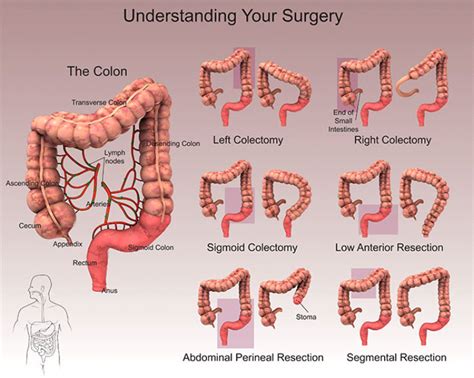
Colon resection surgery is a surgical procedure that involves the removal of a portion of the colon. This procedure is often necessary to treat colon cancer, diverticulitis, or other colon-related health issues. The goal of colon resection surgery is to remove the affected portion of the colon and prevent further complications. There are several types of colon resection surgery, including open colon resection, laparoscopic colon resection, and robotic colon resection. Each type of surgery has its own advantages and disadvantages, and the choice of procedure depends on the individual's specific needs and health status.
Benefits of Colon Resection Surgery
The benefits of colon resection surgery are numerous, and this procedure can have a significant impact on an individual's quality of life. Some of the benefits of colon resection surgery include: * Relief from symptoms: Colon resection surgery can help alleviate symptoms such as abdominal pain, changes in bowel habits, and weight loss. * Prevention of complications: By removing the affected portion of the colon, colon resection surgery can prevent further complications, such as bowel obstruction or perforation. * Improved overall health: Colon resection surgery can help improve an individual's overall health by removing the source of the disease or injury. * Increased survival rates: Colon resection surgery can increase survival rates for individuals with colon cancer, particularly if the cancer is caught in its early stages.Preparation for Colon Resection Surgery
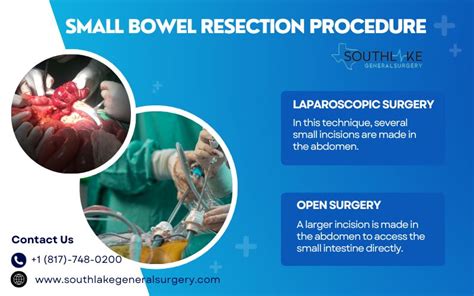
Preparation for colon resection surgery is crucial to ensure a successful outcome. The preparation process typically begins several weeks before the surgery and may involve:
- Dietary changes: Individuals may need to follow a special diet to prepare their colon for surgery.
- Bowel preparation: Individuals may need to undergo bowel preparation to cleanse their colon before surgery.
- Medication management: Individuals may need to stop taking certain medications before surgery, such as blood thinners or diabetes medications.
- Lifestyle changes: Individuals may need to make lifestyle changes, such as quitting smoking or losing weight, to improve their overall health before surgery.
Risks and Complications of Colon Resection Surgery
While colon resection surgery is generally a safe procedure, there are risks and complications associated with it. Some of the potential risks and complications include: * Infection: As with any surgical procedure, there is a risk of infection with colon resection surgery. * Bleeding: There is a risk of bleeding during or after colon resection surgery. * Adhesions: There is a risk of adhesions, or scar tissue, forming in the abdomen after colon resection surgery. * Bowel obstruction: There is a risk of bowel obstruction, or blockage, after colon resection surgery.Recovery from Colon Resection Surgery
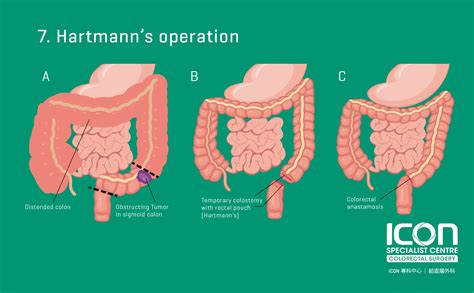
Recovery from colon resection surgery typically takes several weeks to several months. The recovery process may involve:
- Hospital stay: Individuals may need to stay in the hospital for several days after surgery to recover.
- Pain management: Individuals may need to take pain medication to manage discomfort after surgery.
- Dietary changes: Individuals may need to follow a special diet after surgery to help their colon heal.
- Follow-up care: Individuals may need to follow up with their surgeon or healthcare provider after surgery to monitor their recovery and remove any stitches or staples.
Life After Colon Resection Surgery
Life after colon resection surgery can be challenging, but with the right support and care, individuals can make a full recovery. Some tips for life after colon resection surgery include: * Taking it easy: Individuals should avoid heavy lifting, bending, or strenuous activities after surgery. * Eating a healthy diet: Individuals should eat a healthy, balanced diet to help their colon heal. * Staying hydrated: Individuals should drink plenty of water to stay hydrated and help their colon function properly. * Managing stress: Individuals should find healthy ways to manage stress, such as exercise, meditation, or therapy.Types of Colon Resection Surgery
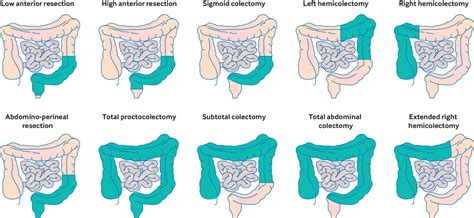
There are several types of colon resection surgery, including:
- Open colon resection: This type of surgery involves making a large incision in the abdomen to access the colon.
- Laparoscopic colon resection: This type of surgery involves making several small incisions in the abdomen to access the colon using a laparoscope.
- Robotic colon resection: This type of surgery involves using a robotic system to access the colon and perform the surgery.
Minimally Invasive Colon Resection Surgery
Minimally invasive colon resection surgery is a type of surgery that involves making small incisions in the abdomen to access the colon. This type of surgery is less invasive than traditional open colon resection surgery and may offer several benefits, including: * Less pain: Minimally invasive colon resection surgery may result in less pain and discomfort after surgery. * Faster recovery: Minimally invasive colon resection surgery may result in a faster recovery time after surgery. * Less scarring: Minimally invasive colon resection surgery may result in less scarring after surgery.Colon Resection Surgery for Colon Cancer
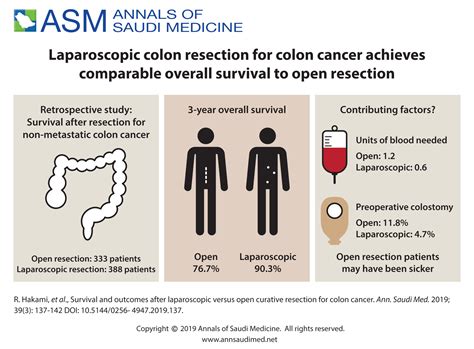
Colon resection surgery is often used to treat colon cancer. The goal of colon resection surgery for colon cancer is to remove the cancerous portion of the colon and prevent further complications. There are several types of colon resection surgery for colon cancer, including:
- Segmental resection: This type of surgery involves removing a portion of the colon that contains the cancer.
- Total colectomy: This type of surgery involves removing the entire colon.
- Proctocolectomy: This type of surgery involves removing the colon and rectum.
Stages of Colon Cancer
The stages of colon cancer are used to describe the extent of the cancer and determine the best course of treatment. The stages of colon cancer include: * Stage 0: This stage describes cancer that is limited to the lining of the colon. * Stage I: This stage describes cancer that has spread to the muscle layer of the colon. * Stage II: This stage describes cancer that has spread to the outer layer of the colon. * Stage III: This stage describes cancer that has spread to nearby lymph nodes. * Stage IV: This stage describes cancer that has spread to distant parts of the body.Colon Resection Surgery for Diverticulitis
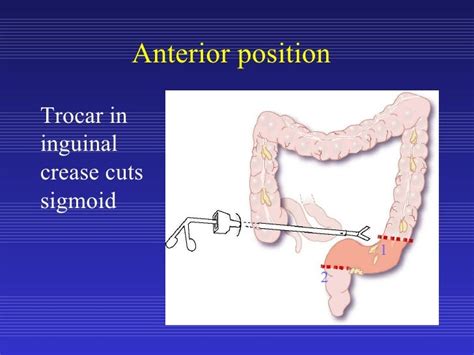
Colon resection surgery is often used to treat diverticulitis, a condition in which the diverticula in the colon become inflamed. The goal of colon resection surgery for diverticulitis is to remove the affected portion of the colon and prevent further complications. There are several types of colon resection surgery for diverticulitis, including:
- Segmental resection: This type of surgery involves removing a portion of the colon that contains the diverticula.
- Total colectomy: This type of surgery involves removing the entire colon.
Symptoms of Diverticulitis
The symptoms of diverticulitis may include: * Abdominal pain: Diverticulitis can cause severe abdominal pain, particularly in the lower left side of the abdomen. * Changes in bowel habits: Diverticulitis can cause changes in bowel habits, such as constipation or diarrhea. * Fever: Diverticulitis can cause a fever, which can range from mild to severe. * Nausea and vomiting: Diverticulitis can cause nausea and vomiting, which can lead to dehydration.Colon Resection Surgery for Other Conditions
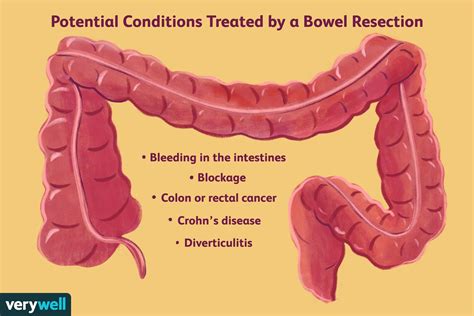
Colon resection surgery can be used to treat a range of conditions, including:
- Colon polyps: Colon polyps are growths that can develop in the colon and may become cancerous over time.
- Inflammatory bowel disease: Inflammatory bowel disease, such as Crohn's disease or ulcerative colitis, can cause inflammation and damage to the colon.
- Colon trauma: Colon trauma, such as a puncture wound or laceration, can require colon resection surgery to repair.
Risks and Complications of Colon Resection Surgery for Other Conditions
The risks and complications of colon resection surgery for other conditions are similar to those for colon cancer and diverticulitis. However, the specific risks and complications may vary depending on the underlying condition and the individual's overall health.What is colon resection surgery?
+Colon resection surgery is a surgical procedure that involves the removal of a portion of the colon. This procedure is often necessary to treat colon cancer, diverticulitis, or other colon-related health issues.
What are the benefits of colon resection surgery?
+The benefits of colon resection surgery include relief from symptoms, prevention of complications, improved overall health, and increased survival rates for individuals with colon cancer.
What are the risks and complications of colon resection surgery?
+The risks and complications of colon resection surgery include infection, bleeding, adhesions, and bowel obstruction. However, these risks can be minimized with proper preparation, surgical technique, and post-operative care.
How long does it take to recover from colon resection surgery?
+The recovery time for colon resection surgery can vary depending on the individual and the type of surgery. However, most individuals can expect to spend several days in the hospital and several weeks recovering at home.
Can colon resection surgery be performed laparoscopically?
+Yes, colon resection surgery can be performed laparoscopically. This type of surgery involves making several small incisions in the abdomen to access the colon using a laparoscope.
As we conclude our discussion on colon resection surgery, it is essential to recognize the importance of this procedure in treating colon-related health issues. By understanding the benefits, risks, and complications of colon resection surgery, individuals can make informed decisions about their healthcare. If you or a loved one is considering colon resection surgery, we encourage you to consult with a qualified healthcare professional to discuss the best course of treatment. Additionally, we invite you to share your thoughts and experiences with colon resection surgery in the comments below. By sharing our knowledge and experiences, we can work together to promote awareness and understanding of this critical topic.
